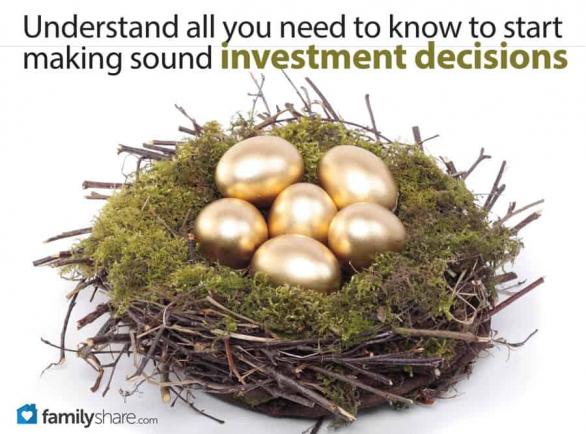
If you are like many people in America, the very idea of investing is scary! It all sounds too complicated. Good news: You can do it! Everything you need to know is right here.
Money in savings accounts and certificates of deposit do not generate enough return to provide income in retirement or enough growth over time to help prepare for retirement. Making other investments could be a wise choice.
Just a few key words will help you understand all you need to know to start making sound investment decisions:
Stocks
Stock in a company is a unit or share of ownership in that company. Hence, investors often say things like, "I own Ford and IBM,"� by which they simply mean they own shares of stock in those companies. Stock prices go up and down quite randomly in the short run, but do tend to move upward over long periods of time. The price you pay for the stock and the price at which you sell the stock is different-you pay a bit more to buy and get a bit less when you sell. Market makers take the difference. You'll also pay a commission to buy and sell stocks. Stock prices can go all the way to zero. There is no limit to how high a stock price can go. Some companies pay dividends to all the shareholders (the people who own the stock) and, some don't.
Bonds
Bonds are loans from companies and governments to investors who buy the loans called bonds. Typically, a bond pays interest, but no principal over long periods of time - at least five years and often up to 30 or more years. At the end of the bond's life (at maturity), the principal is paid. Usually, bonds are issued with a face value of $1,000, but you are often required to buy more than one at a time. The bond market is much bigger than the stock market, but it gets less attention because the prices of bonds - which do move - move less dramatically than stock prices, giving folks less to talk about. The total investment return on bonds tends to be a little lower than the total return on stocks over very long periods of time because bonds tend to be a bit less risky - but no bonds are completely risk free! (You can even lose money on U.S. Treasury Bonds if interest rates rise and you have to sell them.)
Mutual Funds
Mutual Funds are professionally managed pools of money that invest in stocks and/or bonds. The professional managers charge a fee, but they do all of the hard work of researching the investments, deciding when to buy and sell shares and meeting with the management of the companies in which they invest.
Mutual funds are a great tool for novices to start investing. Many mutual funds allow you to make small, monthly purchases so you can begin with almost nothing and build significantly over time. Choosing a mutual fund can be daunting, however.
To simplify the process, consider opening an account with a large brokerage firm like Schwab, Fidelity or TD Ameritrade (you may simply want to choose based on which has the nearest office). All offer different mutual funds that you can invest in without fees and they have people who can help you choose. You already know all you need to know to get started - so get to it.

